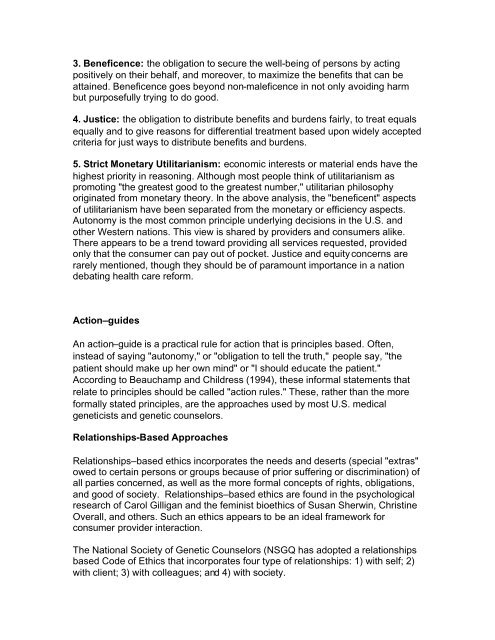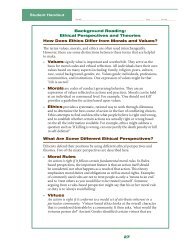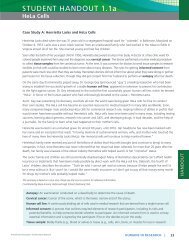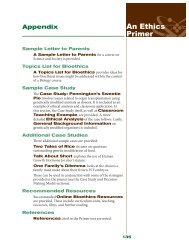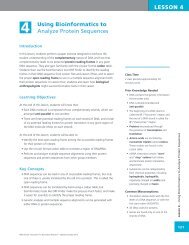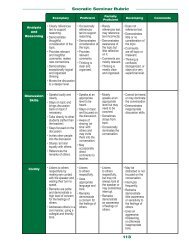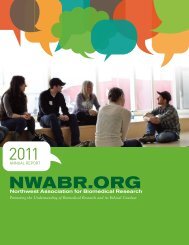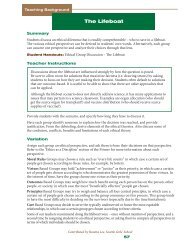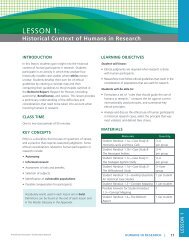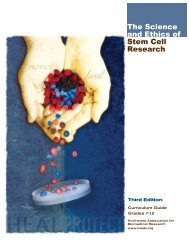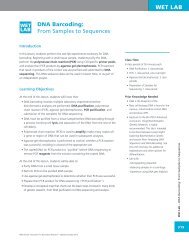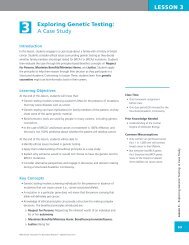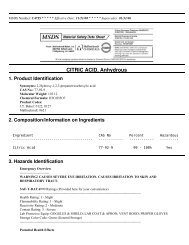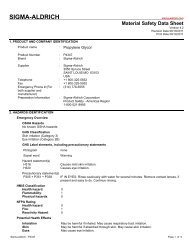Ethics: A Primer for Non-Ethicists (PDF) - ASPB News
Ethics: A Primer for Non-Ethicists (PDF) - ASPB News
Ethics: A Primer for Non-Ethicists (PDF) - ASPB News
You also want an ePaper? Increase the reach of your titles
YUMPU automatically turns print PDFs into web optimized ePapers that Google loves.
3. Beneficence: the obligation to secure the well-being of persons by acting<br />
positively on their behalf, and moreover, to maximize the benefits that can be<br />
attained. Beneficence goes beyond non-maleficence in not only avoiding harm<br />
but purposefully trying to do good.<br />
4. Justice: the obligation to distribute benefits and burdens fairly, to treat equals<br />
equally and to give reasons <strong>for</strong> differential treatment based upon widely accepted<br />
criteria <strong>for</strong> just ways to distribute benefits and burdens.<br />
5. Strict Monetary Utilitarianism: economic interests or material ends have the<br />
highest priority in reasoning. Although most people think of utilitarianism as<br />
promoting "the greatest good to the greatest number," utilitarian philosophy<br />
originated from monetary theory. In the above analysis, the "beneficent" aspects<br />
of utilitarianism have been separated from the monetary or efficiency aspects.<br />
Autonomy is the most common principle underlying decisions in the U.S. and<br />
other Western nations. This view is shared by providers and consumers alike.<br />
There appears to be a trend toward providing all services requested, provided<br />
only that the consumer can pay out of pocket. Justice and equity concerns are<br />
rarely mentioned, though they should be of paramount importance in a nation<br />
debating health care re<strong>for</strong>m.<br />
Action–guides<br />
An action–guide is a practical rule <strong>for</strong> action that is principles based. Often,<br />
instead of saying "autonomy," or "obligation to tell the truth," people say, "the<br />
patient should make up her own mind" or "I should educate the patient."<br />
According to Beauchamp and Childress (1994), these in<strong>for</strong>mal statements that<br />
relate to principles should be called "action rules." These, rather than the more<br />
<strong>for</strong>mally stated principles, are the approaches used by most U.S. medical<br />
geneticists and genetic counselors.<br />
Relationships-Based Approaches<br />
Relationships–based ethics incorporates the needs and deserts (special "extras"<br />
owed to certain persons or groups because of prior suffering or discrimination) of<br />
all parties concerned, as well as the more <strong>for</strong>mal concepts of rights, obligations,<br />
and good of society. Relationships–based ethics are found in the psychological<br />
research of Carol Gilligan and the feminist bioethics of Susan Sherwin, Christine<br />
Overall, and others. Such an ethics appears to be an ideal framework <strong>for</strong><br />
consumer provider interaction.<br />
The National Society of Genetic Counselors (NSGQ has adopted a relationships<br />
based Code of <strong>Ethics</strong> that incorporates four type of relationships: 1) with self; 2)<br />
with client; 3) with colleagues; and 4) with society.


